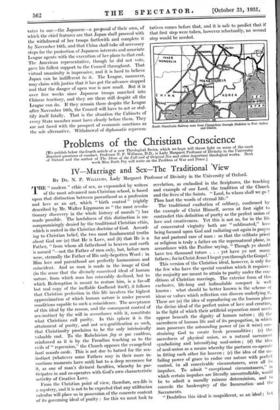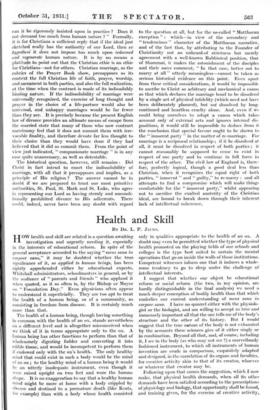Problems of the Christian Conscience
[We publish below the fourth article of a now Theological Series, which we hope will throw light on some of the most disputed questions of conduct. Professor N. P. Williams, D.D., is Lady Margaret Professor of Divinity in the University of Oxford and the author of The Ideas of the Fall and of Original Sin and other important theological workti. Next week Miss Ruth Fry will write on the Problem of War and Peace.]
W—Marriage and Sex—The Traditional View
BY DR. N. P. WILLIAMS, Lady Margaret Professor of Divinity in the University of Oxford.
THE " modern " ethic of sex, as expounded by writers of the most advanced non-Christian school, is based upon that distinction between parenthood as a profession and love as an art, which " birth control " (rightly described by Mr. Walter Lippmann as " the most revolu- tionary discovery in the whole history of morals ") has made possible. The lawfulness of this distinction is un- compromisingly denied by the traditional Christian ethic, which is rooted in the Christian doctrine of God. Accord- ing to Christian belief, the two most fundamental truths about God are (a) that He is Love, and (b) that He is a Father, " from whom all fatherhood in heaven and earth is named "—not the Father of men only, but, before men were, eternally the Father of His only-begotten Word : in Him love and parenthood are perfectly harmonious and coincident. And as man is made in the image of God (in the sense that the divinely conceived ideal of human nature, from which man has miserably declined, but to which Redemption is meant to restore him, is a far-off but real copy of the ineffable Godhead itself), it follows that Christian perfection in this life involves the highest approximation of which human nature is under present conditions capable to such a coincidence. The acceptance of this ideal by the reason, and the consequent control of sex-instinct by the will in accordance with it, constitute what Christians call purity. In this sphere it is the attainment of purity, and not sex-gratification as such, that Christianity proclaims to be the only intrinsically valuable end. To the Rabelaisian fay ce que vouldra,s, reinforced as it is by the Freudian teaching as to the evils of " repression," the Church opposes the evangelical bead mundo corde. This is not due to hatred for the sex- instinct (whatever some Fathers may in their more in- cautious moments have said) but to a deep reverence for it, as one of man's divinest faculties, whereby he par- ticipates in and co-operates with God's own characteristic activity of Creative Love.
From the Christian point of view, therefore, sex-life is a mystery, and it is not to be expected that any utilitarian calculus will place us in possession of the concrete content of its governing ideal of purity for this we must look to revelation, as embodied in the Scriptures, the teaching and example of our Lord, the tradition of the Church and the lives of the Saints. " Lord, to whom shall we go Thou hast the words of eternal life."
The traditional exaltation of celibacy, confirmed by the example of Christ Himself, seems at first sight to contradict this definition of purity as the perfect union of love and creativeness. Yet this is not so, for in the life of consecrated virginity both are " sublimated," love being focused upon God and radiating out again in prayer for and pastoral care of man : so that the Celibate priest or religious is truly a father on the supernatural plane, in accordance with the Pauline saying, " Though ye should have ten thousand tutors . . . yet have ye not many fathers ; for in Christ Jesus I begat you through the Gospel.
This version of the Christian ideal, however, is only for the few who have the special vocation which it requires : the majority are meant to attain to purity under the con- ditions of Christian marriage. The exterior form of this exclusive, life-long and indissoluble compact is well known : what should be better known is the scheme of ideas or values which reflection can discern underlying it. These are (a) the idea of reproducing on the human plane the divine ideal of the perfect union of love-and creation, in the light of which their artificial separation must needs appear beneath the dignity of human nature ; (b) the sacredness of human life and of its propagation; in which man possesses the astounding power of (is it were) con- straining God to create fresh personalitieg ; - (c) the sacredness of physical union, as a natural sacrament symbolizing and intensifying soul-union ; (d) the idea of soul-union as a means whereby the partners co-operate in fitting each other for heaven ; (e) the idea of the un- failing power of grace to endue our nature with perfect control, in all conceivable circumstances, over all its impulses. To admit " exceptional circumstances," in which certain impulses are literally uncontrollable, would tie to admit a morally ruinous determinisin, and to concede the bankruptcy of • the Incarnation • and the Sacraments, " Doubtless this ideal is magnificent, as an ideal ; but can it' be insisted upon in practice ? Does it not demand too much from human nature ? " Formally, it is for Christians a sufficient reply that if the ideal just sketched really has the authority of our Lord, then ex hypothesi it does not impose too much upon redeemed and regenerate human nature. It is by no means a platitude to point out that the Christian ethic is an ethic for Christians—not for others. Christian marriage, as the rubrics of the Prayer Book show, presupposes as its context the full Christian life of faith, prayer, worship, and sacrament in both parties, and also the full realization, at the tithe when the contract is made of its indissolubly binding nature. If the indissolubility of marriage were universally -recognized, the exercise of long thought and prayer in the choice of a life-partner would also be universal, - and unhappy marriages would be far fewer than they are. It is precisely because the present English law of divorce provides an ultimate means of escape from the married state that many of those who now contract matrimony feel that it does not commit them with irre- vocable finality, and therefore devote far less thought to their choice than they would have done if they had believed that it did so commit them. From the point of view just indicated, " companionate marriage " is in any case quite unnecessary, as well as detestable.
The historical question, however, still remains : Did Christ in fact intend to enact the indissolubility of marriage, with all that it presupposes and implies, as a principle of His religion ? The answer cannot be in doubt if we are prepared to trust our most primitive authorities, St. Paul, St. Mark and St. Luke, who agree in representing our Lord as having sternly and uncondi- tionally prohibited divorce to His adherents. There could, indeed, never have been any doubt with regard to the question at all, but for the so-called " Matthaean exception : which—in view of the secondary and " tendencious " character of the Matthaean narrative, and of the fact that, by attributing to the Founder of Christianity not an unheard-of strictness but merely agreement with a well-known Rabbinical position, that of Shammai, it makes the astonishment of the disciples and their naive comment, " In that case, better not to marry at all " utterly meaningless—cannot be taken as serious historical evidence on this point. Even apart from these critical considerations, it would be impossible to ascribe to Christ so arbitrary and mechanical a canon as that which declares the marriage bond to be dissolved by a single act of physical infidelity (which need not have been deliberately planned), but not dissolved by long- continued and heartless cruelty alone. And, even if we could bring ourselves to adopt a canon which takes account only of external acts and ignores internal dis- positions, it would still be impossible to deduce from it the conclusion that special favour ought to be shown to the " innocent party " in the matter of re-marriage. For marriage is a reciprocal relationship ; if it be dissolved at all, it must be dissolved in respect of both parties ; it cannot reasonably be supposed to. cease to exist in respect of one party and to continue in full force in respect of the other. The civil law of England is, there- fore, perfectly logical, though a good deal less than Christian, when it recognizes the equal right of both parties, " innocent " and " guilty," to re-marry : and all attempts to find a compromise which will make things comfortable for the " innocent party," whilst appearing not to sacrifice the exalted austerity of the Christian ideal, are bound to break down through their inherent lack of intellectual coherence,







































 Previous page
Previous page